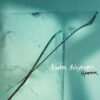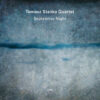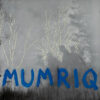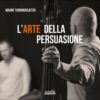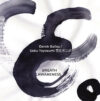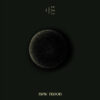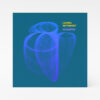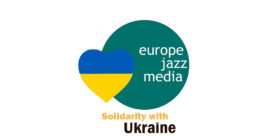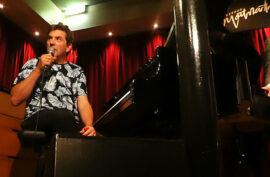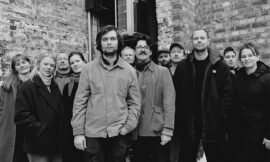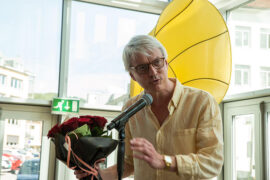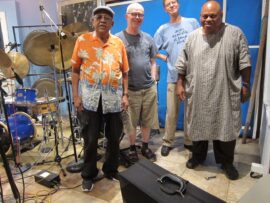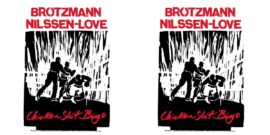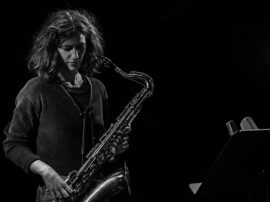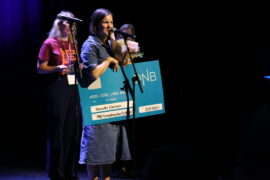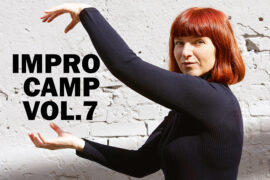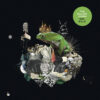
The Killing Popes keep doing what they are doing best and are killing more than ever. This anarchic, Berlin-based brainchild of German drummer-composer Oli Steidle and British producer-keyboardist-bassist Nicholls released its debut album two years ago, Ego Pills, (Shhpuma, 2019), before the Apocalypse. On its follow-up, the post-pandemic «Ego Kill$», still enjoys the company of elite players who played on the debut album – sax player Phillip Gropper, guitarist Frank Möbus and bassist Phil Donkin, who have developed a near-telepathic understanding, plus guest vocalists Jelena Kuljić and Nathalie Sandtrov.
The sonic envelope of «Ego Kill$» is provocative, restless and futurist and pushed even further the unlikely unique blend of disjointed structures, jumping grooves, a jazz statement for the second decade of the 21st century, introjecting aspects of art-rock and electronic club music. The music speaks about contemporary issues, from capitalism to the cult of the individual and consumerism, whilst retaining the humorous and intelligent spirit which The Killing Popes is famous for.
«Ego Kill$» sounds like nothing else, or more likely like the product – with its highly nuanced production – of mad but visionary sonic alchemists who just wanted to party in our so weird present times. It throws you from futurist sounds to manic dance moves and then to intense free jazz outbursts and finally to subversive political statements, and never settles on a familiar mode. It is not a postmodern pastiche but an ultra-modern mix of wild, sometimes reckless ideas and super creative musicians.
The apocalyptic echoes of the pandemic trickle into the dark atmospherics and sober lyrics of «My Life Is Not Your Game», penned by Kuljić, which fumes «the matrix of the doom». The album reaches its emotional peak with «Human Nature», drawing its text from a speech of Russian American anarchist political activist and writer Emma Goldman («Freedom, expansion, opportunity, and, above all, peace and repose, alone can teach us the real dominant factors of human nature and all its wonderful possibilities. Yet, how can anyone speak of it today, with every soul in a prison».) and «King of Soap», again with lyrics by Kuljić, and a totally possessed and manic delivery by her and The Killing Popes. As expected, these anarchistic popes end «Ego Kill$» with a party. «Long Live The Popes».
Eyal Hareuveni
………..
What’s in the group’s name? Popes: do they kill, are they killing, or are they killed themselves? There is an ambiguity here left open.
Berlin drummer Oliver Steidle has a remarkable, stupefying way of fanning out rhythm patterns, superimposing and crossfading them, operate them as sliding panels and agile rotating parts thereby generating kaleidoscopic hyper- and surrealistic musical sceneries, sceneries of rich imagination spiced up with good doses of humor. Linearity becomes largely dissolved in it. Reality particles get dispersed and at the same time are strongly connected by a relentlessly ticking beat. There are no dull moments but constantly innerving surprises opening up instead. Through its clarity, control, and consistency it never feels overloaded but as a liberating wonderland exorcising present nightmares of daily life. Instruments as keyboard, electric guitar, saxophone, electric bass-guitar constitute their own rhythmic pattern volving against or overlapping with the rhythmic pattern of the drums. Think of Conlon Nancarrow, Steve Coleman and Kraftwerk. So, a common role distribution is no longer at work here.
This provides a rich and highly agile generative framework for the absorption of a great variety of intruding parts, parts leaking in, swelling up, blurring, hazing and shimmering, as well as emerging sounds as blowing fanfare riffs, subliminal murmurings and whisperings in the undercurrent. The deeply seated way Steidle reduces and fleshes the music out from and against backgrounds, reminds of Tom Zé once in a while, and the appearing flashing motifs and riffs bear undeniable Monk-marks.
This generative framework emerged from the fruitful collaboration of Oliver Steidle and Dan Nicholls, a real stroke of luck inducing terrific productivity (I was fortunate to see him first in the Three Trapped Tigers configuration at Punkt Festival 2012 in Kristiansand). Keyboarder Nicholls acts both as a contributing musician and as a visionary producer who, above all, ensures that the strengths and magics of Steidle and the other featured musicians – quite a potent crew – are brought to full effect: Frank Möbus (el-g), Phillip Gropper (sax) Phil Donkin (el-b), Jelena Kuljic (voc, sampling) and Nathalie Sandtorv (voc, sampling). But what kind of worlds take shape in this alchemical hotbed? Which tempers, moods, states of mind and sensitivities do these musicians conjure up here? There is the bouncing space odyssee of «Bling Bling Frog», the weird pogo space of «F*u*c*k*», the subaquatic Getümmel/turmoil of «Chthulu», the ghostscapes of «Human Nature», the going berserk of «King of Soap», the glorifying touch of «Long Live The Popes». As crazy sound magicians The Killing Popes cross this undertaking variety of zones.
It’s a very own universe not only of sounds that the Popes conjure. It’s a universe enlivened with mythical creatures inspiring the music as well as acting in and through the music. In short, as popes they take the freedom to summon their own deities and celebrate them amid the horrors, disgust, chaos, drivel, pomposity, grandness and joy of everyday life. It’s a transcendental attitude and quality enabling to enter and give shape to some freeing zones It’s a transcendental attitude and quality enabling to enter and give shape to some freeing zones (and leave behind the pontifical). It’s no spookiness for its own sake, no vain Spielerei. It’s also not wordy message stuff. It’s music with a cause … and an answer to the question how music and music making relates to social and political realities.
The greater part of the pieces was set up by Steidle/Nicholls, while track 4, 8 and 9 were brought together in combinations with the other musicians. «Bling Bling Frog $>», the second piece, gives ample evidence to the highly versatile navigation through a diversity and heterogeneity of sources (excellently captured in the cover image of Travassos) while the intro «Disclaimer» leads listeners to a short, quite introvert side. There is no lingering stasis or sinking in contemplation in the music of this album, however. «Butcher» emphasize this characteristic by its sound splicing. «My Life Is Not Your Game» is an uncommon vocal piece on a text of Jelena Kuljic, a kind of thrilling Hörspiel (in the German radio tradition) with subaquatic phantom voices (sounds a bit as whale music too) and a Sprechgesang voice – very refreshing and intriguing. «Hi Five», the fifth track, starts with spongy synth washes, piercing guitars and then introduces a basic pattern that goes through astounding playful and amusing variations. The beat pattern is never ridden dead here, repetition and variation are in great interchange here. Yes, its beats are taken from contemporary popular music but there’s no fake or overzealous fusion attempt, hey-hey, it’s all used for the Popes’ very own expressive idiom.
«Chthulu», is a bouncing, jumpy affair with plenty flickering space sounds (see the video link below). The video (by Louise Boer) defines Chthonic ones as «beings of the earth, both ancient and up-to-the minute». She imagines chthonic ones «as replete with tentacles, feelers, digits, cords, whiptails, spider legs, and very unruly hair» – a biologically hyper-hybrid creature of amazing flexibility, adaptability and changeability thus. The entity derives from old times Greek subterranean Chthonic deities and cults. So, «Chthulu» can be considered as a paradigmatic piece uniting visual, musical, biological, spiritual and societal aspects.
«Legitimacy Loop» is a great short rattling upbeat to «F*u*c*k*» with its buried and truncated vocals (of Nathalie Sandtorv) and sax snatches evoking the imagination of a weird pogo space. In bits it sounds like an Ian Dury stomp and then at other moments like a muffled version of Die Antwoord. «Human Nature», on a text by Emma Goldmann, is a kind of ‘ghostscape’ with its whispering, its sax sounds emerging from the mist and its wandering ghost voices. It reminds a bit of Laurie Anderson.
«King of Soap» is a highly agile, agitated and turbulent piece with mighty cymbal work on a text by Jelena Kuljic («My brain is melting …»). It is a piece going berserk against complacency. All three vocal tracks have an exceptional touch and don’t fall into common patterns. The finishing «Long Live The Popes» is another instance of The Popes’ cut up technique of truncated sounds. Starting from remote sound echoes and glitches, the piece soon turns into a mighty Sly Stone funk rhythm evoking a Stevie-Wonder Superstition-groove to the glory of the Popes.
«Ego Kills» is as disturbing, unsettling as it is entertaining, rough as it is refined, undermining as it is creatively constructive. It makes turns and bifurcations but leaves a lot to its listeners.
The mentioned associations with existing pieces of music are personal. For other listeners the music might open other associations.
Henning Bolte
Oli Steidle (dr, perc, marimba), Dan Nicholls (prod, keys, b, samp), Jelena Kuljic (v, samp), Phillip Gropper (s), Frank Möbus (el-g), Phil Donkin (el-b), Nathalie Sandtorv (v), Liv Nicholls (backing v)

